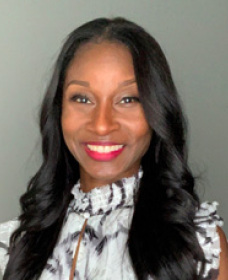
Dorothy Prior
Dorothy Prior Improves Health Outcomes and Disparities in Delaware
In just a year-and-a-half as an active Member of the Junior League of Wilmington, DE, Dorothy Prior has made the most of the leadership opportunities available to her. She has served as her League’s Community Impact Committee Co-Chair and member of the Diversity, Equity, and Inclusion Cross-Functional Working Committee. She is currently the Committee Lead for her League’s Collective Impact Team, and has played a major role in reducing stigma and raising awareness of period equity in her community through the Junior League of Wilmington’s “Stand Up. Period.” campaign. “The Junior League provides me with a space where I can utilize my talents, build new skills and friendships while helping to support my community,” says Prior, a licensed clinical psychologist. “Leadership, communication and teamwork are qualities that I pull from while performing League work and my responsibilities have challenged me to become a more resourceful and innovative leader.”
The training Prior received in her League prepared her to give testimony to the Delaware Senate in support of House Bill 20, which requires public and charter schools that include grades 6-12 to provide free feminine hygiene products in 50% of student bathrooms. The bill was ultimately signed in April 2021. For all of their efforts related to “Stand Up. Period.” Prior and the rest of the Junior League of Wilmington became one of 13 organizations in Delaware to receive the Governor’s Outstanding Volunteer Award for 2021.
“Every chance I get, I speak about my League’s “Stand Up. Period.” campaign and give my elevator speech about our endeavors,” Prior says. “I do this with family members, with friends, and during casual conversations in the community.” In both her professional and personal life, Prior uses the skills of communication, perseverance, and compromise that she has honed in The Junior League. Whether supporting a coworker who was being undercompensated, advocating for increasing DEIB in the workplace, or serving on her county’s Mental Health/Intellectual and Developmental Disabilities Advisory Board, she aims to “build a stronger community where everyone belongs and can share ideas.”
